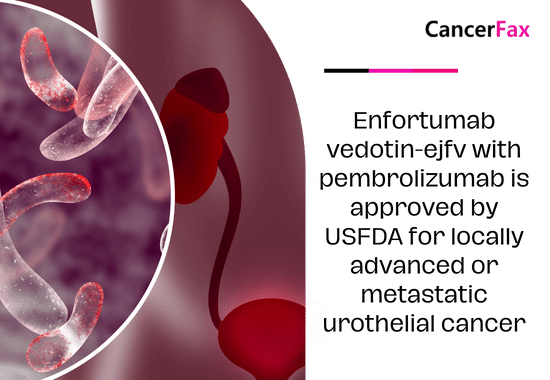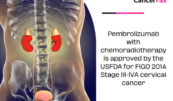Enfortumab vedotin-ejfv with pembrolizumab is approved by USFDA for locally advanced or metastatic urothelial cancer
As of December 15, 2023, the Food and Drug Administration (FDA) approved enfortumab vedotin-ejfv (Padcev, Astellas Pharma) along with pembrolizumab (Keytruda, Merck) for people who have locally advanced or metastatic urothelial carcinoma (la/mUC). The FDA previously gave rapid approval to this combination for patients with locally advanced or metastatic urothelial carcinoma who cannot receive cisplatin-containing treatment.
The study looked at how well it worked in EV-302/KN-A39 (NCT04223856), a randomized, open-label trial with 886 people who had locally advanced or metastatic urothelial carcinoma and had not had any systemic treatment for advanced illness before. Patients were randomly given either enfortumab vedotin-ejfv with pembrolizumab or platinum-based chemotherapy (gemcitabine with either cisplatin or carboplatin). Randomization was categorized based on cisplatin eligibility, PD-L1 expression, and the existence of liver metastases.
The primary efficacy measures were overall survival (OS) and progression-free survival (PFS) evaluated by an impartial central review team without bias.
Enfortumab vedotin-ejfv plus pembrolizumab showed statistically significant improvements in overall survival (OS) and progression-free survival (PFS) compared to platinum-based treatment. The median overall survival was 31.5 months (95% CI: 25.4, not estimable) for patients treated with enfortumab vedotin-ejfv plus pembrolizumab, and 16.1 months (95% CI: 13.9, 18.3) for those who underwent platinum-based chemotherapy. The hazard ratio was 0.47 (95% CI: 0.38, 0.58) with a p-value of less than 0.0001. The median progression-free survival (PFS) was 12.5 months (95% CI: 10.4, 16.6) for patients treated with enfortumab vedotin-ejfv plus pembrolizumab, and 6.3 months (95% CI: 6.2, 6.5) for those who underwent platinum-based chemotherapy. The hazard ratio (HR) was 0.45 (95% CI: 0.38, 0.54) with a p-value of less than 0.0001.
The most frequent adverse reactions (≥20%) observed in patients treated with enfortumab vedotin-ejfv in combination with pembrolizumab included various laboratory abnormalities such as increased aspartate aminotransferase, increased creatinine, rash, increased glucose, peripheral neuropathy, increased lipase, decreased lymphocytes, increased alanine aminotransferase, decreased hemoglobin, fatigue, decreased sodium, decreased phosphate, decreased albumin, pruritus, diarrhea, alopecia, decreased weight, decreased appetite, increased urate, decreased neutrophils, decreased potassium, dry eye, nausea, constipation, increased potassium, dysgeusia, urinary tract infection, and decreased platelets.
The suggested dosage of enfortumab vedotin-ejfv in combination with pembrolizumab is 1.25 mg/kg (up to 125 mg for patients weighing 100 kg or more) given as an intravenous infusion lasting 30 minutes on Days 1 and 8 of a 21-day cycle until disease progression or intolerable side effects.
The suggested dosage of pembrolizumab when combined with enfortumab vedotin-ejfv is 200 mg given through intravenous infusion every 3 weeks or 400 mg every 6 weeks until disease advancement, intolerable toxicity, or two years of treatment.
Susan Hau is a distinguished researcher in the field of cancer cell therapy, with a particular focus on T cell-based approaches and cancer vaccines. Her work spans several innovative treatment modalities, including CAR T-cell therapy, TIL (Tumor-Infiltrating Lymphocyte) therapy, and NK (Natural Killer) cell therapy.
Hau's expertise lies in cancer cell biology, where she has made significant contributions to understanding the complex interactions between immune cells and tumors.
Her research aims to enhance the efficacy of immunotherapies by manipulating the tumor microenvironment and exploring novel ways to activate and direct immune responses against cancer cells.
Throughout her career, Hau has collaborated with leading professors and researchers in the field of cancer treatment, both in the United States and China.
These international experiences have broadened her perspective and contributed to her innovative approach to cancer therapy development.
Hau's work is particularly focused on addressing the challenges of treating advanced and metastatic cancers. She has been involved in clinical trials evaluating the safety and efficacy of various immunotherapy approaches, including the promising Gamma Delta T cell therapy.
- Comments Closed
- March 5th, 2024






ADC-immunotherapy for bladder cancer, Enfortumab vedotin pembrolizumab approval, FDA-approved regimen 2024, First-line bladder cancer breakthrough, Locally advanced UC treatment, Metastatic urothelial carcinoma, Nectin-4 PD-1 dual targeting, Padcev Keytruda combination
CancerFax is the most trusted online platform dedicated to connecting individuals facing advanced-stage cancer with groundbreaking cell therapies.
Send your medical reports and get a free analysis.
🌟 Join us in the fight against cancer! 🌟
Привет,
CancerFax — это самая надежная онлайн-платформа, призванная предоставить людям, столкнувшимся с раком на поздних стадиях, доступ к революционным клеточным методам лечения.
Отправьте свои медицинские заключения и получите бесплатный анализ.
🌟 Присоединяйтесь к нам в борьбе с раком! 🌟